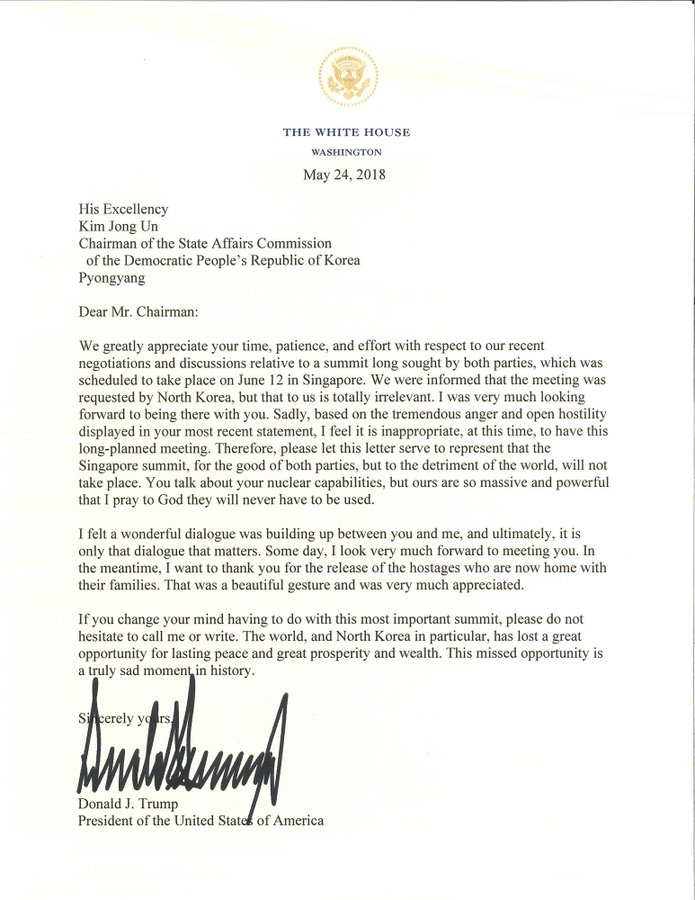Trump Cancels Summit With North Korea’s Kim, Citing ‘Hostility’
By
Updated on
- President cites ‘massive’ U.S. nuclear edge in letter to Kim
- North Korea had warned U.S. of ‘nuclear-to-nuclear’ showdown

President Donald Trump canceled his planned summit with North Korean leader Kim Jong Un that had been scheduled for June 12 in Singapore, citing “tremendous anger and open hostility” in recent statements from Pyongyang.
Trump’s decision was communicated Thursday in a letter to Kim released by the White House.
North Korea hardened its rhetoric toward the U.S. earlier Thursday, warning it was ready for a “nuclear-to-nuclear” showdown if the U.S. didn’t follow through on the summit.
“You talk about your nuclear capabilities, but ours are so massive and powerful that I pray to God they will never have to be used,” Trump wrote.
Stocks turned down sharply as the letter was released, with the S&P 500 index down 0.5 percent at 10:04 a.m. New York time.
With the summit abandoned -- at least temporarily -- the next steps are unclear. Trump has said that if the June 12 meeting were to fall through, the U.S. would continue exerting maximum economic pressure on Kim and his regime.
The highly anticipated summit had been cast by the White House as an opportunity to stave off a military conflict with North Korea and showcase Trump’s ability to make progress where his predecessors had struggled. The president has openly entertained the idea that he could have been awarded the Nobel Peace Prize had the meeting led to a peace agreement between North Korea and the U.S. and South Korea. The countries are technically still at war.
But Trump ultimately ran into the same diplomatic quandary that has flummoxed U.S. presidents for the past 25 years: the inability to persuade a stubborn regime to give up a nuclear program that it regards as key to its survival.
The timing of the president’s letter may be an additional embarrassment to North Korea, as the country made a show of demolishing its main nuclear-weapons test site earlier on Thursday before a select group of foreign journalists.
The exercise was portrayed as the destruction of tunnels used for all six of the isolated nation’s nuclear tests, but there was no independent verification that the site was disabled. Arms control experts say the demolition wouldn’t impede Kim’s regime from further weapons development.
Trump agreed to meet Kim after the two leaders spent most of 2017 exchanging increasingly hostile and bellicose barbs. Seoul led the effort at detente with Pyongyang that led to the two countries competing together at the Winter Olympics.
In March, South Korean officials visited the White House to deliver a message directly from Kim, expressing openness to discuss denuclearization. Over the Easter holiday, Trump secretly dispatched Mike Pompeo, then the CIA director and now the secretary of State, to Pyongyang to lay groundwork for the summit. Trump announced on Twitter May 10 that the meeting would be scheduled for June 12 in Singapore.
Pompeo made another trip to Pyongyang earlier this month where he secured the release of three Korean-Americans Kim’s regime had detained.
With talks on the horizon, Trump shifted toward praising the North Korean dictator in recent months. Trump referred to Kim as “gracious” and “honorable,” and thanked him for releasing the three Americans.
But comments from his National Security Adviser, John Bolton, and others in the administration appeared to throw a wrench in the arrangements. Bolton drew the ire of the North Korean government for saying that the country’s nuclear disarmament should follow the “Libya model” embraced by dictator Muammar Qaddafi, who was later overthrown and killed in a U.S.-backed uprising.
The North Korean regime is acutely aware of Qaddafi’s history, and insisted that its country should be regarded not as seeking to develop nuclear weapons but as a nuclear power in its own right.

No comments:
Post a Comment
Thanks for commenting. Your comments are needed for helping to improve the discussion.